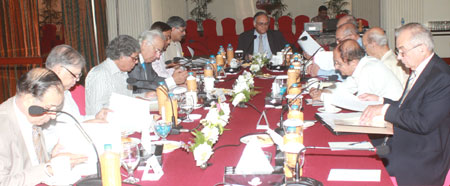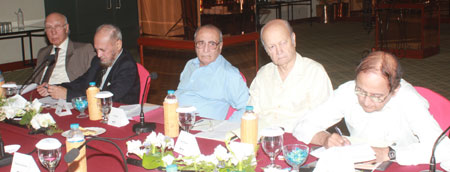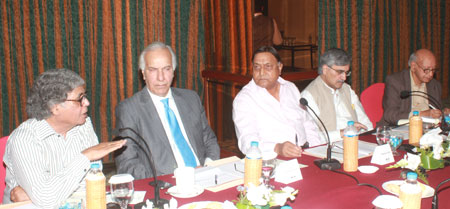|
|
| |
| EVENTS |
|
|
> New challenges emerge as civil-military relations enter new phase
PILDAT Dialogue Group on civil-military relations conducts detailed review
|
| |
|
DGCMR Meeting
May 09, 2013
Lahore
|
|
| |
Dialogue Group on Civil Military Relations (DGCMR) reviewed the current conditions and relevant events and developments over the past 4 months in the context of the 2008-2013 period as the people go to the polls on 11th May. The Group decided to release the following statement: |
|
| |
As Pakistan continues its journey towards maturation of democratic institutions, the civil military relationship, as of May 2013, provides both positive and progressive features as well as some causes of continuing concern. Despite a few instances when a certain degree of tension was experienced as in the episodes of Raymond Davis, the Abbottabad raid, the Kerry Lugar Bill controversy and a couple of other incidents, both the civil, political sphere and the Armed Forces have maintained coordination and cooperation to facilitate the successful completion of the tenure of the previous elected Government from March 2008 to March 2013. As this was the first meeting of the Group since the unprecedented completion of this term of office, the Group recorded its appreciation for the demonstration of shared commitment by both the civil and the military leaderships of the country and the continued movement through the transition phase of caretaker Governments to the elections set for May 11, 2013. The deployment of over 73,000 troops (about double the numbers deployed in the 2008 elections) to enforce security and safety in the polling phase throughout the country is yet another expression of the solidarity that is giving added resonance to the country�s journey of democracy. The Group expressed its deep respects for all those soldiers and officers of the Armed Forces, paramilitary forces and civil forces who have rendered the ultimate sacrifice of their lives to defend the nation against internal terrorism and cross-border incursions and threats. The Group conveyed its profound sympathies and support to members of the bereaved families and to all those who have also suffered injuries and other losses in the ongoing operations to defeat violent extremism and external threats. The Group noted that the number of troops who have suffered fatalities and injuries in Pakistan from the fall-out of 9/11 now exceeds the number of losses suffered in 1971 during the war between India and Pakistan.. Extraordinarily prolonged deployment of troops in the conflict areas requires new levels of perseverance in all ranks and, on the other hand, due attention to this facet by citizens and media. At the same time, a few recent developments with a bearing on civil-military relations need to be addressed. For the first time, consequent to the return to Pakistan of former President Parvez Musharraf in March 2013 and his subsequent arrest in different cases, the nation has witnessed the spectacle, for the first time in its history, of a former COAS being charged with murder and with unconstitutional actions against the judiciary. The Group reiterated that the principle of complete respect for the rule of law for every citizen, regardless of a person�s past or present position, should be the cardinal factor that shapes all individual and institutional actions in this instance as in all other respects as well. It is of vital importance to ensure that the due judicial process be strictly observed and that the defendant is able to exercise all his rights as guaranteed by the law. As in other cases before the Courts, in these cases as well, justice must not only be done, it should be seen to be done. Neither undue haste nor a hostile environment should mark Court proceeding to deprive Gen. (Retd.) Musharraf from a fair trial in each case. The Group noted that, as an institution, the Armed Forces enjoy respect and support by the people of Pakistan. It is vital to maintain national unity and cohesion in the campaign to defeat elements which seek to demolish the structure of the State and the Constitution. Civilized dialogue and fair, balanced debate in public discourse about the respective roles of the civil and military spheres deserve attention and should not be misconstrued as being disrespectful or divisive nor should some comments be misperceived as attempts to hurt the high morale and dignity of our Armed Forces. Recording its strong condemnation of the continuing terrorist attacks on political leaders of certain parties and losses of lives of other citizens in the run-up to the elections; the Group regretted the failure of outgoing federal and provincial governments to control and restrain those extremist elements that are now openly threatening the country�s constitution and its democratic system, making it difficult for the caretaker governments at the Federal and Provincial level to deter such incidents. The Group stated that it was not possible to overlook the failure of the Federal caretaker Government to appoint Ministers for Foreign Affairs, Finance and Defence during a period when the country is facing significant challenges and problems in international and regional geo-politics, economics and security. The Group expressed its fervent hope that the polling process on May 11 will demonstrate the harmony of purpose shared by the civil and military spheres and that the results of the elections will mark the continuation, and the irrevocability of the democratic system. Pakistan�s human resource and infrastructure development priorities in education, health, governance, energy, employment and food security await urgent collective attention by all spheres.
|
|
| |
The Group meeting was chaired by Mr. Javed Jabbar, Former Federal Minister. Those who attended the meeting included Dr. Imran Ali, Professor of Economic History & Business Policy, KSBL, Mr. Sartaj Aziz, Former Federal Minister, Lt. Gen. (Retd.) Arif Bangash, former Governor NWFP, Lt. Gen. (Retd.) Humayun Bangash, Former Ambassador, Lt. Gen. (Retd.) Moinuddin Haider, Former Governor Sindh, Mr. Rustam Shah Mohmand, Former Chief Secretary NWFP, Lt. Gen. (Retd.) Talat Masood, Former Secretary Defence, Mr. Tasneem Noorani, Former Federal Secretary, Mr. Ashraf Jahangir Qazi, Former Ambassador, Dr. Hasan-Askari Rizvi, Defence and Political Analyst, Mr. Ghazi Salahuddin, Senior Analyst, Mr. Mujib-ur-Rehman Shami, Editor in Chief Daily Pakistan, Mr. S. M. Zafar, Former Federal Minister and Mr. Ahmed Bilal Mehboob, President PILDAT. The Dialogue Group on Civil-Military Relations is convened by PILDAT and commenced its periodic deliberations in 2006. |
|
| |
|
|
| |
|
|
| |
|
|
| |
|
|
| |
|
|
| |
|
|
| |
|
|
| |

|
|
| |
|
|
| |

|
|
| |
|
|
| |

|
|
|
|
|
|
|
|
|